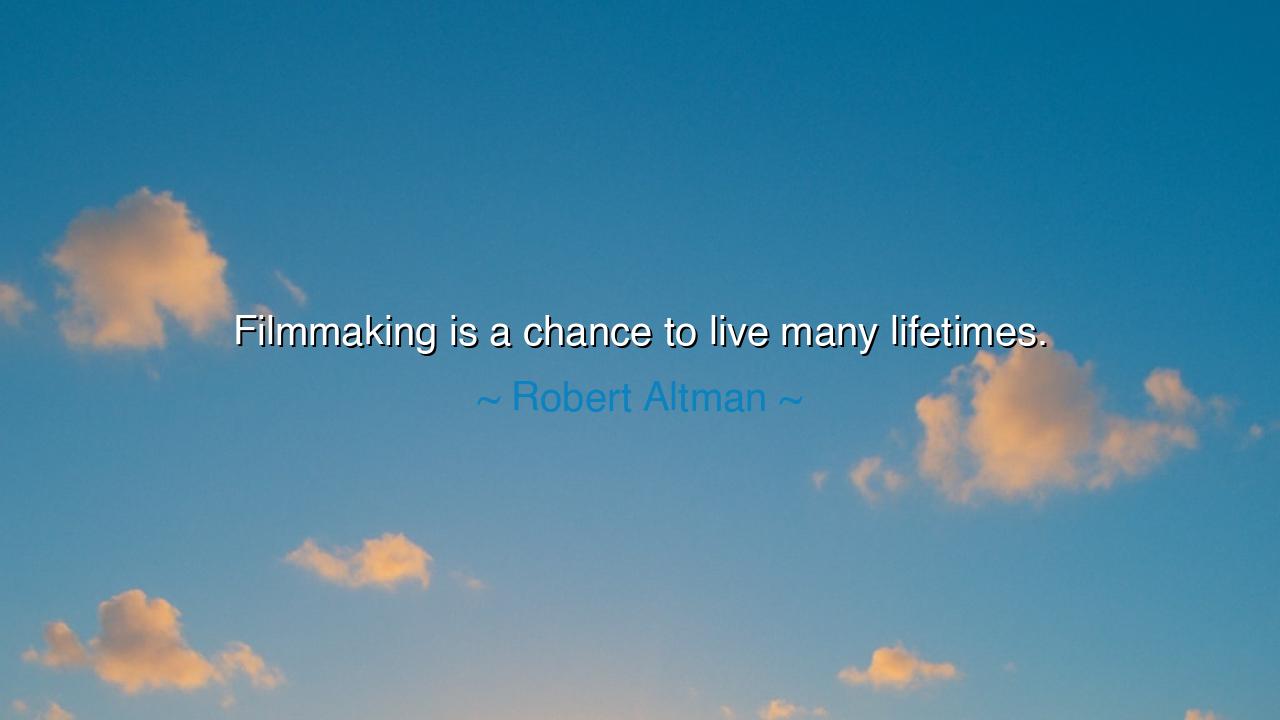
Filmmaking is a chance to live many lifetimes.






Host: The dim light of the late afternoon filters in through the windows, casting a soft glow on the scattered scripts and notebooks on the table. Jack and Jeeny sit across from each other, a feeling of stillness between them, broken only by the occasional rustling of paper. The world outside seems far away, like a distant sound, as their conversation begins to unfold in the quiet space of the room.
Jeeny: "Robert Altman once said, 'Filmmaking is a chance to live many lifetimes.' I’ve always thought that was such an interesting way to look at it. Do you think that’s true, Jack? That filmmaking—whether you're creating or experiencing it—gives you the chance to live many lives?"
Jack: He leans back slightly, his gaze shifting toward the window, where the flickering light creates long, thin shadows across the floor. "I think it’s a powerful way to see it. Film lets you step into different worlds, live through different experiences, become different people. Every movie is a chance to see life from another perspective, to experience emotions, cultures, and moments that you would never encounter in your own life. And as a filmmaker, you get to explore those stories, create them, even if they come from parts of you that you didn’t know existed." He runs a hand through his hair, his voice thoughtful. "It’s like you’re living all these lives without actually leaving your own."
Jeeny: "Exactly," she says, her voice gentle but full of conviction. "It’s like you get to experience all the highs and lows, the joys and sorrows, of characters that are sometimes so different from you, but they still feel real. And as an actor or a creator, you're not just playing one role; you're playing a thousand. You become part of someone else's world, but in doing so, you create a new one." She pauses, her fingers tracing the rim of her coffee cup. "It's like living many lives, even if they’re all imagined."
Jack: "Yeah, and I think that’s why film has such a powerful impact. You don’t just watch a film—you feel it, live it with the characters. The best movies make you see the world differently, make you feel emotions you didn’t know you could experience. You’re not just observing someone else’s life; you’re immersed in it. It’s like the screen becomes a window to a world you can touch, even if it’s for just a few hours." He exhales slowly, as if considering his next words carefully. "It’s more than entertainment. It’s living through other people’s stories, and that’s what makes film such a universal experience."
Jeeny: "And it’s not just about the story, is it? It’s the process of creating it too. The way a director weaves together moments of truth, the way actors bring a character to life, the way each frame captures a slice of time that never existed before. Every film is like a journey, and every person involved in making it is experiencing a lifetime of their own within that story. It’s a chance to capture a moment of someone’s existence, and in doing so, create something that will outlast you." Her voice is a little quieter now, filled with a kind of reverence for the art of filmmaking. "Even though it’s fiction, the emotions are real."
Host: The room feels heavier now, filled with the weight of their conversation. The world outside continues, but inside, their words seem to linger in the air, adding layers of meaning to what had started as a simple reflection on filmmaking. The stillness between them is charged with realization—that filmmaking is not just an art form, but a bridge to something deeper, something eternal.
Jack: "I guess that’s why it feels so important, right? Why so many people dedicate their lives to making films—it’s about capturing something that lives beyond the moment. You experience it, but you also leave something behind for others to experience later. Every film is a window into a world, a piece of time you can step into, and for a few hours, you can live someone else’s life." He pauses for a moment, his voice softening. "Maybe that’s why films stay with you long after you leave the theater. It’s not just the story—it’s the fact that for a moment, you were someone else."
Jeeny: "And in that moment, you are transformed. You live their joys, their struggles, their entire journey, and it leaves a mark on you. It changes how you see the world." She smiles softly, her eyes sparkling. "That’s the magic of it. You might leave the theater, but a part of you stays there, in that story, in those lives."
Host: The air is thick with a sense of understanding, as if the weight of their words has opened something deeper—something that transcends the simplicity of a conversation. In this small, quiet room, Jack and Jeeny are sharing in something that feels larger than them both: the power of storytelling and the ability of film to offer us a chance to live many lifetimes, to experience the world through different eyes, and to carry those experiences with us long after the credits roll.
Outside, the world continues its steady course, but inside, there is a stillness—a moment of connection to the truth of Robert Altman’s words. To be a filmmaker, or even a viewer, is to step into the lives of others and, for a brief time, live their story as if it were your own.
The evening stretches on, and the world outside, for a moment, seems distant—an echo of the many lives that films offer us the chance to live.






AAdministratorAdministrator
Welcome, honored guests. Please leave a comment, we will respond soon